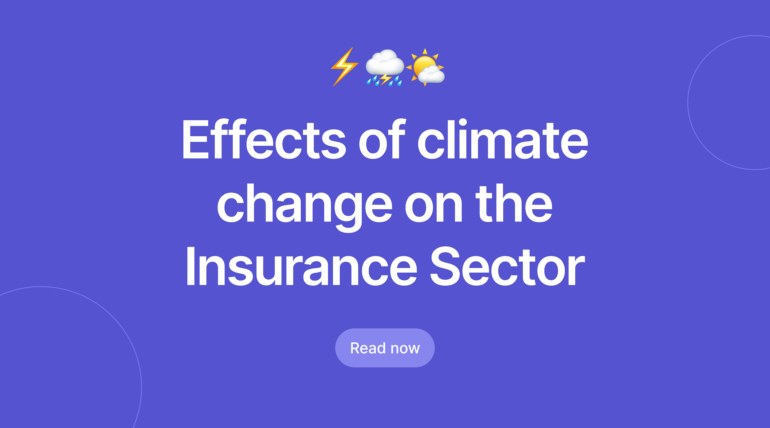
Climate change is one of the most pressing issues of our time, and it has far-reaching implications for many industries, including the insurance sector. As severe weather wreaks havoc on our world and challenges insurance underwriting, these institutions can leverage hybrid cloud and AI to build more sustainable business models.
In this blog post, we will explore the impact of climate change on the insurance industry and how technology can be used to develop sustainable solutions. We will also discuss five ways climate change can impact insurance companies and how they can prepare for these changes using predictive analytics tools.
How climate change can affect insurance payouts
Climate change is causing more frequent and severe natural disasters, which can lead to large-scale losses and increased payouts for insurers. Individuals living in certain areas are especially susceptible to these natural disasters, making them harder to insure or requiring a more complex claims process. As a result, high-risk areas may be subject to higher premiums as insurers attempt to offset increased potential losses from future weather events. These changing conditions are putting rising pressure on insurance companies, and policies must be adapted accordingly to mitigate future financial risks associated with climate change.
How claims and asset management can be impacted
Climate change can also affect claims and asset management for insurance companies. Companies must allocate resources more efficiently to respond quickly and effectively to extreme weather events. Additionally, insurers must reevaluate their policies to reflect changes in climate patterns and shifting risks.
For example, insurers must review traditional coverage areas and determine if they need to adjust premiums or policy stipulations to protect themselves from financial losses. It is also essential to consider the long-term effects of climate change, such as rising sea levels, that may reduce property values or render them uninsurable.
The effect on property loss control
One of the most important areas of concern for insurers is property loss control because of climate change. As global warming and other adverse events become more frequent, businesses and property owners are in high-risk areas. Some top insurance companies have also started focussing on creating property claims software.
The impact of cost allocation
Cost allocation and calculation are essential components of the insurance industry. They involve assigning and accounting for costs to different departments, products, services, or goals within a business. However, as environmental changes become more pervasive, they put considerable strain on cost allocation needs and procedures. This results in increased business losses due to property damage, business interruption, and other factors that must be absorbed into the company’s overall cost structure.
For instance, insurers must consider natural disasters that disrupt the supply chain and other costs associated with the recovery process. Similarly, companies may need to adjust their cost allocation following unexpected market volatility or changes in demand due to climate-change-related weather events.
Policy management considerations
The insurance industry needs to adjust its policy and program management strategies due to the implications of climate change. One way to do this is by introducing new risk management protocols or modifying existing ones to manage potential losses better. This could include reevaluating catastrophe modelling techniques or considering shifting consumer demands in response to changing environmental conditions.
In addition, insurers must be proactive in their underwriting process to ensure they are financially protected from potential losses. This may include changing their policy limits or adjusting the risk appetite of certain products or services.
How can insurance companies prepare for climate change?
Climate change is a growing concern for the insurance industry. As the frequency and severity of extreme weather-related events increase, insurers face the dual challenge of addressing escalating climate change risks and shifting industry regulations. In this blog, we will explore how insurance companies can prepare for climate change.

Using predictive analytics tools
Predictive analytics tools can help insurers identify and manage potential risks associated with climate change. These tools use historical data to predict future trends and can help insurers make informed decisions about risk management. For example, predictive analytics can help insurers identify areas most vulnerable to natural disasters and adjust their policies accordingly. This can help insurers reduce their risk exposure and minimize losses.
Automation to reduce risk and increase profit
Automation can help insurers reduce risk and increase profit by streamlining their operations. By automating routine tasks, insurers can free their employees to focus on more complex tasks requiring human expertise. Automation can also help insurers identify potential risks and opportunities in real-time, allowing them to respond quickly to changing market conditions.
Claims management solutions
Claims management solutions can help insurers manage claims more efficiently and effectively. These solutions use advanced analytics to identify fraudulent claims and streamline the claims process. By reducing the time and resources required to process claims; insurers can improve customer satisfaction and reduce costs.
Geospatial analytics
Geospatial analytics can help insurers identify areas most vulnerable to natural disasters. By analyzing data from satellite imagery, weather reports, and other sources, insurers can identify areas at high risk of flooding, wildfires, and other natural disasters. This can help insurers adjust their policies accordingly and reduce their risk exposure.
Sum up
In conclusion, climate change is a growing concern for the insurance industry. By using predictive analytics tools, automation claims management solutions and geospatial analytics; insurers can prepare for climate change and reduce risk exposure. These tools can help insurers make informed decisions about risk management, streamline their operations, and improve customer satisfaction.







